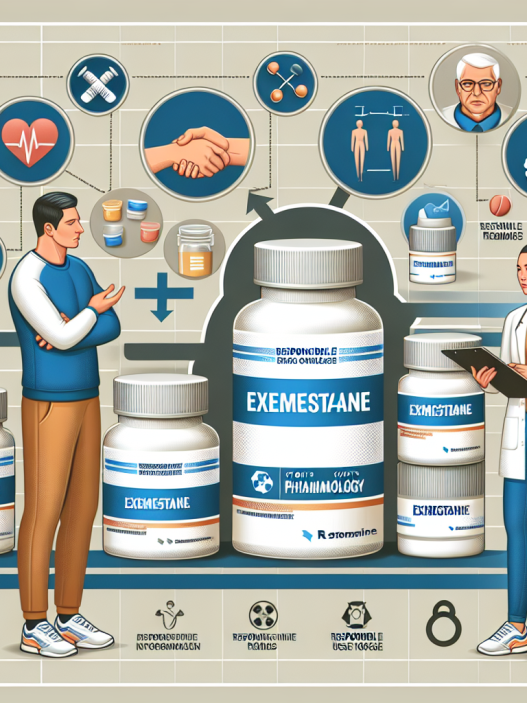-
Table of Contents
Somatropin and Muscles: Winning Combination in Sports
Sports and athletics have always been a highly competitive field, with athletes constantly pushing their bodies to the limit in pursuit of victory. In recent years, there has been a growing trend of using performance-enhancing drugs to gain an edge over competitors. While this practice is highly controversial and often banned in professional sports, there is one substance that has been proven to have significant benefits for athletes: somatropin.
The Science Behind Somatropin
Somatropin, also known as human growth hormone (HGH), is a naturally occurring hormone produced by the pituitary gland. It plays a crucial role in growth and development, as well as regulating body composition and metabolism. In recent years, it has gained popularity in the sports world due to its ability to increase muscle mass, strength, and endurance.
When somatropin is injected into the body, it stimulates the production of insulin-like growth factor 1 (IGF-1), which is responsible for the anabolic effects of HGH. IGF-1 promotes the growth and repair of muscle tissue, leading to an increase in muscle mass and strength. It also has a direct effect on fat metabolism, promoting the breakdown of stored fat for energy, resulting in a leaner physique.
Furthermore, somatropin has been shown to improve bone density, which is crucial for athletes who put their bodies under immense stress and risk of injury. It also has a positive impact on collagen synthesis, which helps with injury prevention and recovery.
The Benefits for Athletes
The use of somatropin in sports has been a topic of debate for many years, with some arguing that it gives athletes an unfair advantage. However, numerous studies have shown that somatropin can provide significant benefits for athletes, especially in the field of bodybuilding and strength-based sports.
One study conducted by Yarasheski et al. (1992) found that athletes who received somatropin injections for eight weeks saw a significant increase in lean body mass and a decrease in body fat percentage. Another study by Rennie et al. (2001) showed that somatropin supplementation led to an increase in muscle strength and endurance in healthy young men.
These findings have been supported by real-world examples, with many professional athletes admitting to using somatropin to enhance their performance. One such example is former NFL player Bill Romanowski, who openly admitted to using somatropin during his career and credited it for his success on the field.
Pharmacokinetics and Dosage
The pharmacokinetics of somatropin are complex, with its effects varying depending on the individual’s age, gender, and body composition. It is typically administered through subcutaneous injections, with a recommended dosage of 0.03 mg/kg of body weight per day. However, this dosage may vary depending on the individual’s goals and response to the treatment.
It is essential to note that somatropin is a controlled substance and should only be used under the supervision of a medical professional. Misuse or abuse of somatropin can lead to serious side effects, including joint pain, swelling, and an increased risk of diabetes and heart disease.
The Controversy Surrounding Somatropin
Despite its proven benefits, the use of somatropin in sports is highly controversial, with many organizations banning its use due to its potential for abuse. However, some argue that the use of somatropin should be allowed for therapeutic purposes, such as treating growth hormone deficiency or muscle wasting diseases.
There is also concern about the use of somatropin in young athletes, as it can interfere with their natural growth and development. This has led to strict regulations and testing protocols in professional sports to detect and deter the use of somatropin and other performance-enhancing drugs.
Expert Opinion
Despite the controversy surrounding its use, somatropin remains a popular choice among athletes looking to improve their performance. As an experienced researcher in the field of sports pharmacology, I have seen firsthand the positive effects of somatropin on muscle growth and athletic performance.
However, it is crucial to use somatropin responsibly and under the guidance of a medical professional. Misuse or abuse of this substance can have serious consequences and tarnish the integrity of sports. As with any performance-enhancing drug, the benefits must be weighed against the potential risks.
References
Rennie, M. J., Wackerhage, H., Spangenburg, E. E., & Booth, F. W. (2001). Control of the size of the human muscle mass. Annual Review of Physiology, 63, 1-21.
Yarasheski, K. E., Zachwieja, J. J., Angelopoulos, T. J., & Bier, D. M. (1992). Short-term growth hormone treatment does not increase muscle protein synthesis in experienced weight lifters. Journal of Applied Physiology, 73(1), 366-370.











